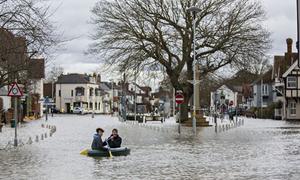Infrastructure protectionU.K. infrastructure facing tough challenges as extreme weather events multiply
The U.K. Institute of Civil Engineering’s (ICE) State of the Nation: Infrastructure 2014 report has highlighted the fact that more frequent extreme weather events will make it increasingly difficult to operate U.K. infrastructure networks in all conditions at the level of service U.K. residents have come to expect, and people’s expectations of availability will need to change. The report grades the U.K.’s Transport, Energy, Flood, Waste, and Water networks from A to E, suggesting more needed to be done if the United Kingdom is to have world class infrastructure.

U.K. government begins climate change evaluation // Source: vfej.vn
The U.K. Institute of Civil Engineering’s (ICE) State of the Nation: Infrastructure 2014 report has highlighted the fact that more frequent extreme weather events will make it increasingly difficult to operate U.K. infrastructure networks in all conditions at the level of service U.K. residents have come to expect, and people’s expectations of availability will need to change. The report grades the U.K.’s Transport, Energy, Flood, Waste, and Water networks from A to E, highlighting the progress since 2010 in improving infrastructure and positioning it as a core enabler of economic growth, but suggests more needed to be done if the United Kingdom is to have world class infrastructure — in particular on the issue of resiliency, given its impact on the economy and the major challenges ahead. This was highlighted by the “at risk” or “requires attention” grades for Flood Management, Energy, and Local Transport networks, due to the narrowing gap between supply and demand for energy, inadequate resilience to flooding, and the decline in maintenance of both flood defenses and local roads following investment cuts.
An ICE release notes that the report said resilience — including the “domino effect” where the failure of one system can affect the operation of another — should be embedded into the criteria used as a basis for making decisions on priority infrastructure projects, better to reflect future challenges.
It also warned, however, that while the United Kingdom needs to build resilience, the U.K. infrastructure cannot be resilient to every eventuality, and that it will become more difficult to operate all infrastructure networks, at all times, in all conditions. The reports says that a shift in the public’s expectations on infrastructure availability would be needed.
State of the Nation report chair and ICE vice president Keith Clarke CBE, said: “As the 2013-14 winter floods showed, unplanned interruptions in our networks are costly to society and the economy. They happen because we are trying to run all services at all times, and are deemed unacceptable as the public expect a certain level of service. Government ultimately bears the risk for the resulting impact.
